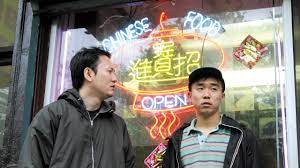In 2004, Sean Baker and Shih-Ching Tsou collaborated on the film Take Out. Ming Ding (Charles Jang) works for a small Chinese restaurant, delivering takeout orders on his bicycle. He’s living life on the margins, sharing a shabby, overcrowded apartment and sending everything he can to his wife and child back in China.
Ming wants to lessen the burden on his family. It’s traditional for them to cover the cost of his undocumented passage to America, but he’s already covered the cost for them–and borrowed heavily from a local loan shark to do it, trading one exorbitant debt for another. He’s been trying to handle it solo, but as Take Out opens, that becomes impossible: men burst into his home, harangue him about missing payments, demand $800 by the end of the day, and smash a hammer between his shoulder blades just to emphasize their point.
Ming’s quest–come up with the money or watch as the loan shark doubles his debt–gives Take Out a ticking clock, but the movie is more interested in observation than intensity. It’s an up-close, on-the-ground portrayal of a community and a locale, one that reveals exactly how much of a mistake Ming made trying to go it alone. His patchwork community is full of people who, though far from financially secure themselves, will still dig deep to cover him just because he’s the one currently in the worst trouble. The locale–a cross-section of New York ranging from grimy to moderately upscale–is trickier; Ming can’t count on it to do anything for him. He needs an unprecedented total of tips to close the gap, and not only is he not sure he can make it, he’s not sure anything he can do will have any effect at all. He can’t speak enough English to make small talk with the customers. He’s too stressed to smile to put them at ease. He’s on his bike in the rain, and sometimes that means he’s going to be late. Sometimes the order is going to be wrong. The customers, with no awareness of how important they are to him tonight, mete out their little slivers of his fate with a terrifying casualness. They don’t know him. The restaurant manager, Big Sister (Wang-Thye Lee), may loosely count as part of their world–she’s the one they talk to when they place the orders, the one they sometimes joke with–but Ming definitely doesn’t. Take Out isn’t just great at showing you a community and a locale, it’s great at making you feel the gulf between the two.
Take Out could easily have been written as a thriller, but it’s less interested in its initial burst of violence and more interested in the lingering pain and discomfort that come with it: it’s focused on the bruise, not the moment when the hammer comes down. And it asks: Who gets to see our bruises? And what happens when they do?
Take Out is streaming on the Criterion Channel.


